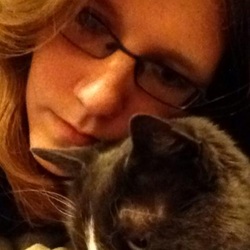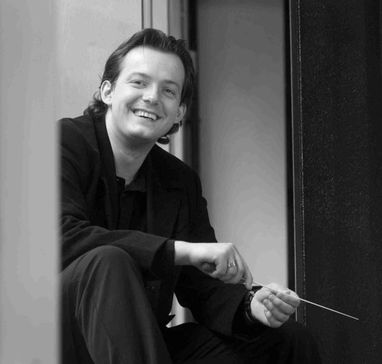Ashley's InsightsMusings on music, teaching, life, and interconnectedness. Archives
April 2020
Categories
All
|
Back to Blog
Happy April Fool's Day!4/1/2014 I'm going to try to be better about actually blogging, I swear. Ludwig is feeling pretty good, Lise is being super affectionate at my side, and it's warmish outside. And I get to teach trigonometry this afternoon, so life is good. I, in the meantime, have been feeling bluesy as of late and may try to write/record a bit this week. So yes, for people who have been asking for stuff from me, it may actually happen. The problem is that I am incredibly self-conscious. I tell my students to be brave, but then I balk at auditions, write loads and hide it all. It bothered me last night at rehearsal when I passed up solo auditions because I got nervous. Fear is such a self-destructive emotion. It's a new month, so perhaps I'm saying that I resolve to change that. But for now, enjoy some Moody Blues. Because some days I truly am my father's daughter.
0 Comments
Read More
Back to Blog
The Tale of the Sick Kitty3/6/2014  On February 6th, one of my cats was diagnosed with renal failure. The past month has been utterly devastating both emotionally and financially. I set up a GoFundMe page to help raise money for Ludwig's care. Take a look at http://www.gofundme.com/6puwig to get the full story, and please spread the word. Fortunately, I can now say that Ludwig is responding to treatment and we are out of crisis mode. I am still trying desperately to find a balance between making sure he gets all of his care (including daily subcutaneous fluid injections) and jetsetting around the state, which has caused me to drop out of one of my choirs. However, my two cats are absolutely worth the sacrifice, and if I can give them the best, healthiest lives possible, then I will do so.
Back to Blog
Brief Reflections on Business1/21/2014 In November I made the move from part-time tutor to full-time tutor, teacher, and educational specialist. It's been an interesting eight weeks thus far, and I have been fortunate in having steady clientele and great word of mouth.
The actual transition has not been an easy one; I am not terribly cutthroat, which does not always bode well for business sense. I also prefer keeping my rates as low as possible so that high-quality support is possible for as many people as possible. This is great for my clients, but bad for me personally. I have to take on more clients to compensate, which causes great sacrifice when it comes to my personal life (I work 7 days a week and often late into the night). I also did not factor things such as car maintenance into my rates when I was part-time, but now I find myself driving up to 150 miles per day. This is a massive financial burden. The question for me has become "how do I find a balance to make this job, which I dearly love, sustainable for me long-term?" I have made the tough decision to raise my rates for new clients to $80 per hour, which is still actually far less than what most professional tutors in the area charge but will provide a bit more towards the cost of upkeeping the business, my car, and my computer (being able to afford rent and utilities would be nice as well). I try to schedule clients in the same area each day to minimize traffic issues, but trying to be accommodating often makes this impossible, and I spend days scrambling. The route I've decided is most prudent is to continue on as I am currently, and hopefully after this round of SAT students moves on, I can increase my income slightly. I want to be able to afford an apartment of my own so I can have a studio to work out of and hopefully decrease my travel a bit. Starting my own business has been a thrilling ride thus far, and I love feeling like I am actually doing something good in the world and helping people who need it. I look forward to continue building business and finding that balance that I am currently missing.
Back to Blog
A Statement of Purpose9/24/2013  Notre Dame de Paris Notre Dame de Paris I started this site with the intention of promoting myself as a musician, and I plan on continuing this route. However, my interests have always been many, and lately my teaching business has picked up, so I am deciding to divide this site's purpose between my music and my teaching passions. To me, the link between being a musician and being a teacher is obvious. Music is the quintessential interdisciplinary field; to be a good musician and a good musical scholar, one needs to have a strong grasp not only on music theory and performance practice but also on mathematical relationships, acoustics, plot structure, and the historical and political context behind the music and performance. One could go on for days about how the context of the time and the architecture of Notre Dame de Paris were pivotal in shaping the polyphony of Leoninus and Perotinus or how Iannis Xenakis carefully designed the Phillips Pavilion at the 1958 World Expo to create a wall of sound out of something as mundane as burning charcoal. I will not do this here, but I will assert that yes, a person can study the theory and technical aspects of a piece and "learn" it on a certain level, but he/she will not truly be able to understand and appreciate it without some degree of background, be it historical, mathematical, or otherwise. If someone were to ask me why I am qualified to teach across many subjects, I would argue that I am a good musician; I have endeavored to learn as much as possible in many fields and continue to do so, and I truly enjoy sharing what I have discovered with others. Music therapy is a widely known treatment for anxiety and a wide array of developmental issues that capitalizes upon the universal nature of music. Children with speech and language issues can often see massive breakthroughs when words are put to song. Repetitive counting and layering of rhythms can help strengthen fundamental math skills as well as life and study skills. And the general enjoyment of music alone can help reduce stress and stress-related issues in everyone. I have worked to incorporate many of the same techniques I use to reduce tension as a singer into exercises with my students, and I have myriad pieces of anecdotal evidence showing how stress reduction leads to academic success. Because I seek to work with individual students and small group settings, I make it a point to get to know every student and build a connection. I am not a therapist, but I can incorporate some of the same principles that makes music therapy so successful for so many. As I continue to develop this site and myself as a musician, teacher, and I guess as a businesswoman, I will endeavor to further flesh out my feelings as to how music and education overlap on this blog, and I hope to document my own trials and successes along the way. It should be an interesting journey.
Back to Blog
A Momentous Day for Boston and for Music6/25/2013  Andris Nelsons (photo by Adrian Burrows) Andris Nelsons (photo by Adrian Burrows) Today I had the astounding opportunity to see classical music history in the making. A coworker of my friend Callie sings with the Tanglewood Festival Chorus and and thus had an invitation to see conductor Andris Nelsons take the helm of the Boston Symphony Orchestra; knowing my passion for orchestral music and background, she invited me along for a "lunchtime Q&A and speech-making". I, of course, would have in no way passed this opportunity up. Andris Nelsons has big shoes to fill; he is officially the Music Director Designate until the start of the 2014-2015 season and will at that point succeed James Levine as the 15th Music Director of the BSO. Born in Latvia in 1978, Maestro Nelsons is a trained trumpeter and has been the much lauded conductor of the City of Birmingham Symphony Orchestra since 2008. He grew up in a highly musical family and is married to soprano Kristīne Opolais, who recently made waves in her Met debut as Magda in Puccini's La Rondine. With such a pedigree, one can only imagine and hope that Maestro Nelsons carries on the stellar musicianship, forward momentum, and energy Maestro Levine injected into the BSO during his reign. Having had the pleasure of hearing Andris Nelsons speak about his artistic vision, his background, and his wishes to become a part of the Boston fabric, I at least have no doubt of his energy. He waxed philosophical at every corner about how music feeds the soul and pandered to the Boston crowd, calling the city America's cultural center. He spoke about attending sporting events (he's throwing out the first pitch at Fenway tonight), getting a "large apartment" in the city for his young family, and invigorating the BSO with his favorites, Bruckner and Shostakovich, all with the dazed and giddy look of a young man trying to convince himself that this pageantry is all real. While James Levine sparked criticism for dividing his time and focus between Boston and the Met, Andris Nelsons seems poised to reinvigorate the Boston classical music scene both with his baton and his public persona and thus reclaim music's rightful place at the cultural center of the city. I don't think it is a secret to anyone that the classical music world is at a crossroads. The new media revolution and an aging demographic have shrunk concert attendance, and a studied arrogance and elitism that permeates the scene has been effective at alienating younger patrons. Boston particularly has the added challenge of being home to a staggering number of high-quality arts groups all competing for a shrinking audience. As someone with an eye on these trends and a purely selfish stake in overcoming them, I have been watching the BSO as it has searched for James Levine's replacement to see how, if at all, their choice would reflect an effort to combat this decline as well. I am admittedly a fan of James Levine; I have seen him both at Symphony Hall and Lincoln Center, but in one short hour, Andris Nelsons won me over as the perfect choice for Boston musically and politically. Today's event began with introductory speeches by Ted Kelly and Maestro Nelsons, and they included many of the platitudes one would expect to hear in such a situation. However, Maestro Nelsons soon made an analogy that really struck me in terms of audience development; to paraphrase, Maestro Nelsons asserted that just as one needs to periodically go to the doctor for a physical check-up, so must one periodically experience live music for a "check-up of the soul". Andris Nelsons in one very brief statement, essentially issued a manifesto carving out the BSO's place in Boston; he does not see classical music, or really any art form, as being ancillary to the nature of the city or its denizens, and he seems willing to put in the work to humanize himself and the symphony and thus regain relevance. We musicians and smaller organizations can learn a great deal from just this simple introduction to Andris Nelsons. Too often we forget in the course of our programming and planning why we do it all. Performing live music is not a hobby and not a treat; it is something that a significant portion of the populace devotes countless hours to rehearsing and participating in. Live music is both a check-up for the soul as Andris Nelsons asserted today and an essential part of the human experience. Music serves as a time capsule, capturing both the mood of a composer and his/her peers and the mood and practices of the groups performing that composer's work at any given time. It communicates to the masses intricate emotions that no other language has truly been able to fully express and carries with it an unbelievable amount of power and nuance. If we as musicians and artists can create an honest and complete context for what we do; if we can stand behind our work with the same kind of conviction, high-mindedness, and unabashed hope, I believe we can begin to reverse this trend of shrinking audiences and increased obscurity. Good luck, Maestro Nelsons; I look forward to hearing you in Symphony Hall.
Back to Blog
Inaugurating the blog3/4/2013 More will come soon, but the first blog post is always the hardest to write. I look forward to sharing my musical thoughts, memes, and arguments with the world!
|
 RSS Feed
RSS Feed
